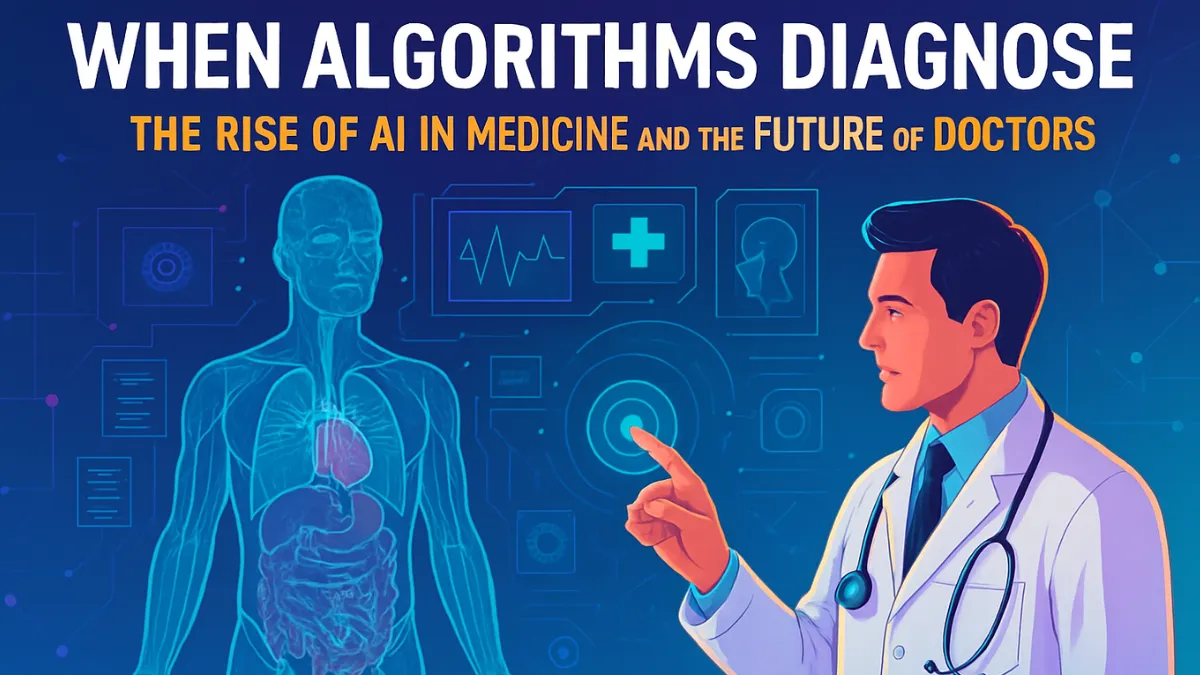Future Of Doctors is being reshaped by the rapid advancements in artificial intelligence (AI), raising a fundamental question: Will AI replace doctors or simply enhance their capabilities? As machine learning algorithms become increasingly capable of diagnosing diseases, analyzing medical images, and predicting health outcomes, the traditional role of a doctor is undergoing a profound transformation.
AI is not just a futuristic concept anymore—it’s already here, playing critical roles in radiology, dermatology, pathology, and even in mental health screening. While this digital revolution promises faster, more accurate medical decisions, it also sparks debates about the boundaries of machine-driven care.
How AI Is Entering the Exam Room
AI systems, particularly those trained on large datasets, are proving exceptionally good at pattern recognition—something that medicine heavily relies on. AI-powered tools can now:
- Detect early signs of cancer from X-rays and MRIs
- Analyze retina scans to predict diabetes complications
- Screen for skin disorders better than some specialists
- Provide real-time diagnosis through wearable devices
- Optimize treatment plans based on patient history
Future of doctors: These capabilities are not just experimental. Tools like IBM Watson, Google’s DeepMind, and various AI diagnostic platforms are already deployed in hospitals and clinics around the world.
Doctors vs. Algorithms: A Partnership, Not a Competition
The idea that AI will completely replace doctors is oversimplified. In reality, the most effective approach lies in augmented intelligence—where human doctors and AI systems work together to deliver better outcomes.
For example, while an AI can spot anomalies in a CT scan faster than a human, it lacks empathy, ethical judgment, and the ability to consider social and psychological aspects of a patient’s condition. Doctors provide context, experience, and a human connection that algorithms cannot replicate.
Benefits of AI in Medicine
- Faster diagnosis – reducing time to treatment
- Increased accuracy – fewer diagnostic errors
- Better resource allocation – especially in overloaded healthcare systems
- Remote care – expanding access through telemedicine
- Predictive analytics – anticipating complications before they occur
- 24/7 monitoring – via wearables and IoT health devices
- Cost efficiency – reducing unnecessary tests and interventions
Challenges and Limitations
Despite its promise, AI in medicine faces several challenges:
- Data privacy concerns
- Bias in algorithms due to non-diverse training data
- Overreliance on machine decisions
- Lack of regulation for AI-based tools
- Accountability issues when errors occur
Future of doctors, Doctors are also skeptical about trusting black-box models whose decision-making processes aren’t transparent.
Global Impact and Accessibility
In developing countries, AI could revolutionize healthcare by offering diagnostics in areas where specialists are scarce. Smartphones with AI-powered diagnostic tools can help detect diseases in rural regions, monitor maternal health, or track infectious diseases—bridging the healthcare gap.
The Evolving Role of Doctors
As AI takes over repetitive and data-heavy tasks, doctors can focus more on:
- Patient communication and empathy
- Personalized care strategies
- Ethical decision-making
- Interpreting AI recommendations
- Continual learning and adaptation to new tech
Medical education is also evolving to include data literacy, ethics in AI, and human-machine collaboration.
What Lies Ahead?
The future of medicine(Future of doctors) will not be man or machine—it will be man and machine. AI will likely become a trusted assistant, helping doctors make better decisions, reduce burnout, and serve more patients efficiently.
Rather than fearing displacement, doctors should see AI as a tool that empowers them to do what they do best—heal. The stethoscope was once a technological revolution too; AI might just be the stethoscope of the 21st century.
Conclusion
The rise of AI in healthcare is not a threat but an opportunity to reimagine the doctor’s role in a tech-augmented world. As algorithms begin to diagnose and machines continue to learn, doctors will evolve—not disappear. The future of doctors lies in embracing AI, guiding it ethically, and ensuring that human touch remains at the heart of healing.








